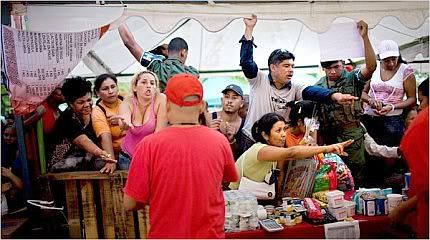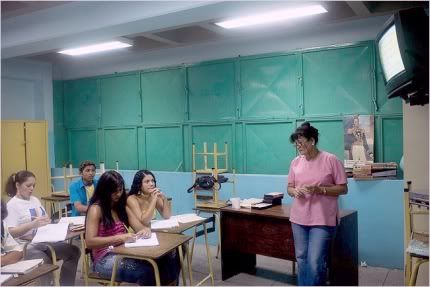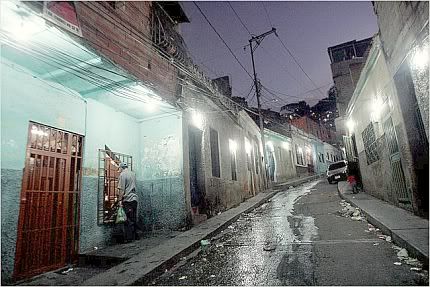La opción para el futuro de Venezuela.
World Business. | |
| Venezuela's Fateful Choice By JENS ERIK GOULD Published: November 30, 2007 | |
|
| |
| | |
| CARACAS, Venezuela, Nov. 29 As petrodollars stream into oil-producing countries, Western officials have begun to demand greater accountability for how they are spent. Some countries known for corruption, like Nigeria and Azerbaijan, have heeded the call, increasing their financial transparency, or at least paying lip service to it. But Venezuela under the leadership of President Hugo Chávez appears headed in the opposite direction. "We see Venezuela on the other side of the road," said Mercedes de Freitas, executive director of Transparency International here. The group, which tries to combat corruption worldwide, ranks Venezuela as the least transparent country in Latin America and 162 out of 179 nations globally. And that could soon fall even lower. On Sunday, Venezuelans will vote on constitutional changes that would, among other things, grant Mr. Chávez unparalleled power to run the country's finances as he sees fit. If the referendum is approved, government accounting is expected to become still harder to fathom, and foreign businesses, many of them already afraid to invest, will find Venezuela even more forbidding. Already, Mr. Chávez's government is putting large amounts of oil revenue into development funds and state-owned companies that operate outside the official budget and are not subject to audits or legislative approval. The Fund for National Development, a leading fund of this sort, has received more than $30 billion since 2005 without regularly disclosing its balance, the progress of projects it finances, the whereabouts of billions of dollars it invests in bonds, or how often it receives revenue injections from the state oil company, Petróleos de Venezuela. Under the proposed changes, Mr. Chávez seeks to formally strip the central bank of its autonomy, giving him the power to dictate monetary policy and the spending of excess foreign-currency reserves. Another measure would eliminate an already neglected rainy-day fund. Opinion polls released in the last week have found Mr. Chávez's proposals tied or trailing the opposition position among likely voters, after months of polls showing it likely to pass. In recent weeks, students have rallied in Caracas to protest the changes, and some of those demonstrations have turned violent. On Thursday, tens of thousands of people flooded the streets of the capital in opposition to the referendum proposals. Venezuela's foreign minister, Nicolás Maduro, asserted on Wednesday that a United States Embassy official was conspiring to defeat the referendum proposals, and threatened to expel the diplomat. And Mr. Chávez said this week that CNN was trying to instigate his assassination. Like this sort of political volatility, reduced access to information on public finances is expected to make investing in Venezuela a riskier prospect, said Francisco Rodríguez, who teaches economics and Latin American studies at Wesleyan University. Investors in Venezuelan bonds already struggle to ascertain what assets back the country's debt and what resources it could count on in the event of a financial crisis. Oil profits are the basis of Mr. Chávez's intended socialist revolution, which aims to help the poor in Venezuela and other countries. Petrodollars finance social benefits including free health care, free education and government-subsidized food, and oil profits permit the vast public spending that has helped create nearly four years of economic growth. But large chunks of revenue have been managed opaquely to a degree that it is hard to measure the state's success in carrying out its social projects or in monitoring corruption. "It's not really clear how the money is invested," said Theresa Paiz-Fredel, a senior director of Fitch Ratings. The Extractive Industries Transparency Initiative, a program started by the British government with support from the World Bank, says that a lack of clarity in oil-revenue management can be a sign of the "resource curse," where natural resources fuel corruption and undermine the rule of law instead of contributing to long-term growth. Venezuela is not one of the 15 signers of the initiative, and some economists say it is laboring under the curse. They point to corruption charges this year against the state oil company, leveled by a pro-Chávez lawmaker. Officials denied wrongdoing, but eventually conceded that the oil company had too few rigs. Separately, a director of Petróleos de Venezuela resigned after a shadowy incident involving company executives, a charter flight to Buenos Aires with a Venezuelan businessman, and a briefcase with $800,000 in cash. Facing mounting criticism, Finance Minister Rodrigo Cabezas has released two reports this year disclosing the Fund for National Development's revenue balance, and he promised in May to conduct a comprehensive audit of all projects the fund financed to give it "more transparency." But analysts trying to gain access to the data are still frustrated, saying that the reports are neither detailed nor frequent enough. The New York Times requested interviews to obtain details on the fund from the finance ministry, the central bank, Petróleos de Venezuela and the state-run Banco del Tesoro. After more than two months of efforts, none of those organizations granted an interview or provided any information. | |
|
| |
| | |
| Simón Escalona, vice president of the National Assembly's finance commission, said he had not "seen any lack of transparency" in the development fund. But, Mr. Escalona was unable to provide updated information on its total assets, bond investments or on transfers from the state oil company to the fund. Mr. Chávez has long sought control over Venezuela's foreign reserves. The central bank has already lost much of its independence; a report in March by Barclays Capital said transfers from the bank to the Fund for National Development were determined more by Mr. Chávez than the bank. Still, the central bankers occasionally criticize government policy, a practice likely to end if the referendum passes, as will most public debate on state spending, Mr. Rodríguez of Wesleyan said. And the unfettered spending of reserves could increase inflation, at 17 percent already the highest in Latin America. "They will stop being foreign reserves," Mr. Rodríguez said, and become just "another account." In October, Fitch Ratings lowered Venezuela's outlook to negative from stable, saying that inflation and a weakening currency had made it vulnerable to a decrease in oil prices. Still, oil-producing countries are not generally known for their transparency. Qatar, for instance, does not publish figures for its large investment fund, which is fed by oil revenue, according to Luc Marchand, an analyst at Standard & Poor's. But even Russia, despite criticism that the government is weakening institutions, is adopting a system used by Norway that will integrate its main oil fund into the budget and make it easier to track, according to Frank Gill, also of Standard & Poor's. And authorities in Moscow have strict investment criteria for the oil fund. Venezuela differs from Russia and many petrostates, including Nigeria, Saudi Arabia and Kuwait, in another way. Those countries all run budget surpluses, while Venezuela's heavy social spending results in a deficit, according to data compiled by Mr. Marchand. Some economists, like Mark Weisbrot at the Center for Economic and Policy Research in Washington, say that social spending, which he puts at 21 percent of the gross domestic product last year, is proof that Mr. Chávez is combating the resource curse. Mr. Weisbrot points to government statistics showing that poverty has fallen to nearly 30 percent from 44 percent since Mr. Chávez was elected nine years ago, and unemployment has dropped to 8 percent from 15 percent. Mr. Chávez frames his designs on full control of oil revenue as part of a crusade against Washington-based institutions like the World Bank and the International Monetary Fund, which he says advance American business interests. A deputy finance minister, Rafael Isea, told state television last summer that eliminating the central bank's autonomy would curb the I.M.F.'s ability to "manage our reserves and influence internal policies." The government has nationalized electric and phone companies here that once had American companies as stockholders, has ceased filing financial reports of the state oil company to the Securities and Exchange Commission, and has announced plans to withdraw Venezuela from the I.M.F. and the World Bank. In September, Mr. Chávez ordered the oil company to convert its investment accounts from dollars to euros and Asian currencies. The march to socialism has not been as smooth as he may have hoped. Officials became aware that plans to leave the I.M.F. could conceivably result in a default of Venezuelan debt. Months after the announcement, the country is still part of the I.M.F. Students of history warn that the 1970s oil boom also coincided with heavy spending and questionable accountability. In his book "The Magical State," Fernando Coronil, a professor of history and anthropology at the University of Michigan, documents how policies intended to spur development in the 1970s loaded Venezuela with debt and helped create financial crisis in the 1980s and '90s. "It's one thing to declare the intent to use these resources for the benefit of the population, it's another to prove it," he said, "and in order to do that you have to have checks and balances." | |
| |





0 Comments:
Post a Comment
Subscribe to Post Comments [Atom]
<< Home